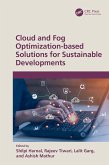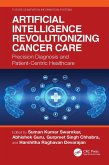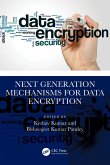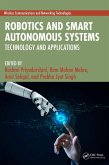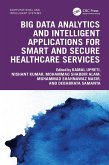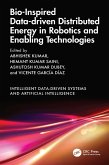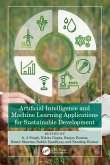Cloud and Fog Optimization-based Solutions for Sustainable Developments (eBook, PDF)
Redaktion: Harnal, Shilpi; Mathur, Ashish; Garg, Lalit; Tiwari, Rajeev
53,95 €
53,95 €
inkl. MwSt.
Sofort per Download lieferbar

27 °P sammeln
53,95 €
Als Download kaufen

53,95 €
inkl. MwSt.
Sofort per Download lieferbar

27 °P sammeln
Jetzt verschenken
Alle Infos zum eBook verschenken
53,95 €
inkl. MwSt.
Sofort per Download lieferbar
Alle Infos zum eBook verschenken

27 °P sammeln
Cloud and Fog Optimization-based Solutions for Sustainable Developments (eBook, PDF)
Redaktion: Harnal, Shilpi; Mathur, Ashish; Garg, Lalit; Tiwari, Rajeev
- Format: PDF
- Merkliste
- Auf die Merkliste
- Bewerten Bewerten
- Teilen
- Produkt teilen
- Produkterinnerung
- Produkterinnerung

Bitte loggen Sie sich zunächst in Ihr Kundenkonto ein oder registrieren Sie sich bei
bücher.de, um das eBook-Abo tolino select nutzen zu können.
Hier können Sie sich einloggen
Hier können Sie sich einloggen
Sie sind bereits eingeloggt. Klicken Sie auf 2. tolino select Abo, um fortzufahren.

Bitte loggen Sie sich zunächst in Ihr Kundenkonto ein oder registrieren Sie sich bei bücher.de, um das eBook-Abo tolino select nutzen zu können.
This text discusses resource management solutions for the Internet of Things devices in fog computing architecture, management of metropolitan mobility for public transport and smart vehicles with cloud, fog, and edge computing, and waste management with cloud and fog computing for sustainable development.
- Geräte: PC
- mit Kopierschutz
- eBook Hilfe
Andere Kunden interessierten sich auch für
![Cloud and Fog Optimization-based Solutions for Sustainable Developments (eBook, ePUB) Cloud and Fog Optimization-based Solutions for Sustainable Developments (eBook, ePUB)]() Cloud and Fog Optimization-based Solutions for Sustainable Developments (eBook, ePUB)54,95 €
Cloud and Fog Optimization-based Solutions for Sustainable Developments (eBook, ePUB)54,95 €![Artificial Intelligence Revolutionizing Cancer Care (eBook, PDF) Artificial Intelligence Revolutionizing Cancer Care (eBook, PDF)]() Artificial Intelligence Revolutionizing Cancer Care (eBook, PDF)52,95 €
Artificial Intelligence Revolutionizing Cancer Care (eBook, PDF)52,95 €![Next Generation Mechanisms for Data Encryption (eBook, PDF) Next Generation Mechanisms for Data Encryption (eBook, PDF)]() Next Generation Mechanisms for Data Encryption (eBook, PDF)51,95 €
Next Generation Mechanisms for Data Encryption (eBook, PDF)51,95 €![Robotics and Smart Autonomous Systems (eBook, PDF) Robotics and Smart Autonomous Systems (eBook, PDF)]() Robotics and Smart Autonomous Systems (eBook, PDF)53,95 €
Robotics and Smart Autonomous Systems (eBook, PDF)53,95 €![Big Data Analytics and Intelligent Applications for Smart and Secure Healthcare Services (eBook, PDF) Big Data Analytics and Intelligent Applications for Smart and Secure Healthcare Services (eBook, PDF)]() Big Data Analytics and Intelligent Applications for Smart and Secure Healthcare Services (eBook, PDF)52,95 €
Big Data Analytics and Intelligent Applications for Smart and Secure Healthcare Services (eBook, PDF)52,95 €![Bio-Inspired Data-driven Distributed Energy in Robotics and Enabling Technologies (eBook, PDF) Bio-Inspired Data-driven Distributed Energy in Robotics and Enabling Technologies (eBook, PDF)]() Bio-Inspired Data-driven Distributed Energy in Robotics and Enabling Technologies (eBook, PDF)51,95 €
Bio-Inspired Data-driven Distributed Energy in Robotics and Enabling Technologies (eBook, PDF)51,95 €![Artificial Intelligence and Machine Learning Applications for Sustainable Development (eBook, PDF) Artificial Intelligence and Machine Learning Applications for Sustainable Development (eBook, PDF)]() Artificial Intelligence and Machine Learning Applications for Sustainable Development (eBook, PDF)165,95 €
Artificial Intelligence and Machine Learning Applications for Sustainable Development (eBook, PDF)165,95 €-
-
-
This text discusses resource management solutions for the Internet of Things devices in fog computing architecture, management of metropolitan mobility for public transport and smart vehicles with cloud, fog, and edge computing, and waste management with cloud and fog computing for sustainable development.
Dieser Download kann aus rechtlichen Gründen nur mit Rechnungsadresse in A, B, BG, CY, CZ, D, DK, EW, E, FIN, F, GR, HR, H, IRL, I, LT, L, LR, M, NL, PL, P, R, S, SLO, SK ausgeliefert werden.
Produktdetails
- Produktdetails
- Verlag: Taylor & Francis eBooks
- Seitenzahl: 338
- Erscheinungstermin: 24. Dezember 2024
- Englisch
- ISBN-13: 9781040262924
- Artikelnr.: 72314356
- Verlag: Taylor & Francis eBooks
- Seitenzahl: 338
- Erscheinungstermin: 24. Dezember 2024
- Englisch
- ISBN-13: 9781040262924
- Artikelnr.: 72314356
- Herstellerkennzeichnung Die Herstellerinformationen sind derzeit nicht verfügbar.
Shilpi Harnal is an Associate Professor in the Department of Computer Science & Engineering at Chandigarh University, Mohali, Punjab, India. She specializes in cloud computing and security. She has worked on fog computing, underwater wireless sensor networks (UWSN), and artificial intelligence. She has around 14 years of teaching experience and has published 20 patents and 35+ research papers in various international, national, and peer-reviewed journals, books, and conferences. Rajeev Tiwari is a Professor and Dean in the School of Computer Science and Engineering at IILM University Greater Noida, India. He is a senior IEEE member. He has more than 16 years of research and teaching experience. His broad areas of research include cloud computing, MANET, VANET, fog computing, QoS in such network environments, cache invalidation techniques, the Internet of Things (IoT), big data analytics, and machine learning. He has 70+ international publications in SCI, and Scopus-indexed journals and conferences. Lalit Garg is an Associate Professor in the Department of Computer Information Systems, at the University of Malta, Malta, and an Honorary Lecturer at the University of Liverpool, UK. He has been a researcher at Nanyang Technological University, Singapore, and Ulster University, UK. He has published 150+ high impact publications in refereed journals/conferences/books, 17 edited books, and 22 patents. His research interests are business intelligence, machine learning, data science, deep learning, cloud computing, mobile computing, the Internet of Things (IoT), and information systems. Ashish Mathur is a Professor in the Center for Inter-disciplinary Research and Innovation (CIDRI), at UPES Dehradun, India. He worked as a research associate at the Nanotechnology and Integrated Bio-Engineering Center (NIBEC), at the University of Ulster, UK. His noteworthy contributions in the field of research are reflected in his published 116 research papers in high impact journals including Biosensors and Bioelectronics, Scientific Reports, IEEE Sensors, Applied Surface Science, and Sensor. His research focuses on developing novel sensors using nanotechnology for societal benefits, which include women's safety, drug abuse, and environmental issues.
1. Resource Management Solutions for IoT Devices in Fog Computing
Architecture. 2. Applications and Challenges for Sustainable development
with Cloud/Fog/Edge computing. 3. Management of metropolitan mobility for
public transport and smart vehicles with fog computing. 4. Smart Grid
Infrastructure with Cloud/Fog Computing for Sustainable Development. 5.
Smart Agriculture with Cloud/Fog Computing and Sensor Networks for
Sustainable Development. 6. Enhancing Sustainable Development through AI
and Non-AI based Application Placement in FC. 7. Fog Computing for
Sustainable Smart Cities: Software Deployment, Data Analytics and Legal
Considerations. 8. Sustainable Data Driven Irrigation and fertilization
based on Artificial Intelligence. 9. Security Challenges and Solutions in
Cloud, Fog, and Edge Computing for Sustainable Development. 10. Empowering
Fog Computing for Achieving Sustainability. 11. Resource Allocation Using a
Hybrid Evolutionary Model and Machine Learning. 12. The Cloud Frontier: A
Paradigm Shift in Sustainable Supply Chain Management through Data
Analytics. 13. Waste management sustainability using Cloud and Fog
computing. 14. Fog Computing: Advancing Sustainable Development Goals
(SDGs). 15. Energy efficient framework for cloud-fog environment for
sustainable development.
Architecture. 2. Applications and Challenges for Sustainable development
with Cloud/Fog/Edge computing. 3. Management of metropolitan mobility for
public transport and smart vehicles with fog computing. 4. Smart Grid
Infrastructure with Cloud/Fog Computing for Sustainable Development. 5.
Smart Agriculture with Cloud/Fog Computing and Sensor Networks for
Sustainable Development. 6. Enhancing Sustainable Development through AI
and Non-AI based Application Placement in FC. 7. Fog Computing for
Sustainable Smart Cities: Software Deployment, Data Analytics and Legal
Considerations. 8. Sustainable Data Driven Irrigation and fertilization
based on Artificial Intelligence. 9. Security Challenges and Solutions in
Cloud, Fog, and Edge Computing for Sustainable Development. 10. Empowering
Fog Computing for Achieving Sustainability. 11. Resource Allocation Using a
Hybrid Evolutionary Model and Machine Learning. 12. The Cloud Frontier: A
Paradigm Shift in Sustainable Supply Chain Management through Data
Analytics. 13. Waste management sustainability using Cloud and Fog
computing. 14. Fog Computing: Advancing Sustainable Development Goals
(SDGs). 15. Energy efficient framework for cloud-fog environment for
sustainable development.
1. Resource Management Solutions for IoT Devices in Fog Computing
Architecture. 2. Applications and Challenges for Sustainable development
with Cloud/Fog/Edge computing. 3. Management of metropolitan mobility for
public transport and smart vehicles with fog computing. 4. Smart Grid
Infrastructure with Cloud/Fog Computing for Sustainable Development. 5.
Smart Agriculture with Cloud/Fog Computing and Sensor Networks for
Sustainable Development. 6. Enhancing Sustainable Development through AI
and Non-AI based Application Placement in FC. 7. Fog Computing for
Sustainable Smart Cities: Software Deployment, Data Analytics and Legal
Considerations. 8. Sustainable Data Driven Irrigation and fertilization
based on Artificial Intelligence. 9. Security Challenges and Solutions in
Cloud, Fog, and Edge Computing for Sustainable Development. 10. Empowering
Fog Computing for Achieving Sustainability. 11. Resource Allocation Using a
Hybrid Evolutionary Model and Machine Learning. 12. The Cloud Frontier: A
Paradigm Shift in Sustainable Supply Chain Management through Data
Analytics. 13. Waste management sustainability using Cloud and Fog
computing. 14. Fog Computing: Advancing Sustainable Development Goals
(SDGs). 15. Energy efficient framework for cloud-fog environment for
sustainable development.
Architecture. 2. Applications and Challenges for Sustainable development
with Cloud/Fog/Edge computing. 3. Management of metropolitan mobility for
public transport and smart vehicles with fog computing. 4. Smart Grid
Infrastructure with Cloud/Fog Computing for Sustainable Development. 5.
Smart Agriculture with Cloud/Fog Computing and Sensor Networks for
Sustainable Development. 6. Enhancing Sustainable Development through AI
and Non-AI based Application Placement in FC. 7. Fog Computing for
Sustainable Smart Cities: Software Deployment, Data Analytics and Legal
Considerations. 8. Sustainable Data Driven Irrigation and fertilization
based on Artificial Intelligence. 9. Security Challenges and Solutions in
Cloud, Fog, and Edge Computing for Sustainable Development. 10. Empowering
Fog Computing for Achieving Sustainability. 11. Resource Allocation Using a
Hybrid Evolutionary Model and Machine Learning. 12. The Cloud Frontier: A
Paradigm Shift in Sustainable Supply Chain Management through Data
Analytics. 13. Waste management sustainability using Cloud and Fog
computing. 14. Fog Computing: Advancing Sustainable Development Goals
(SDGs). 15. Energy efficient framework for cloud-fog environment for
sustainable development.

